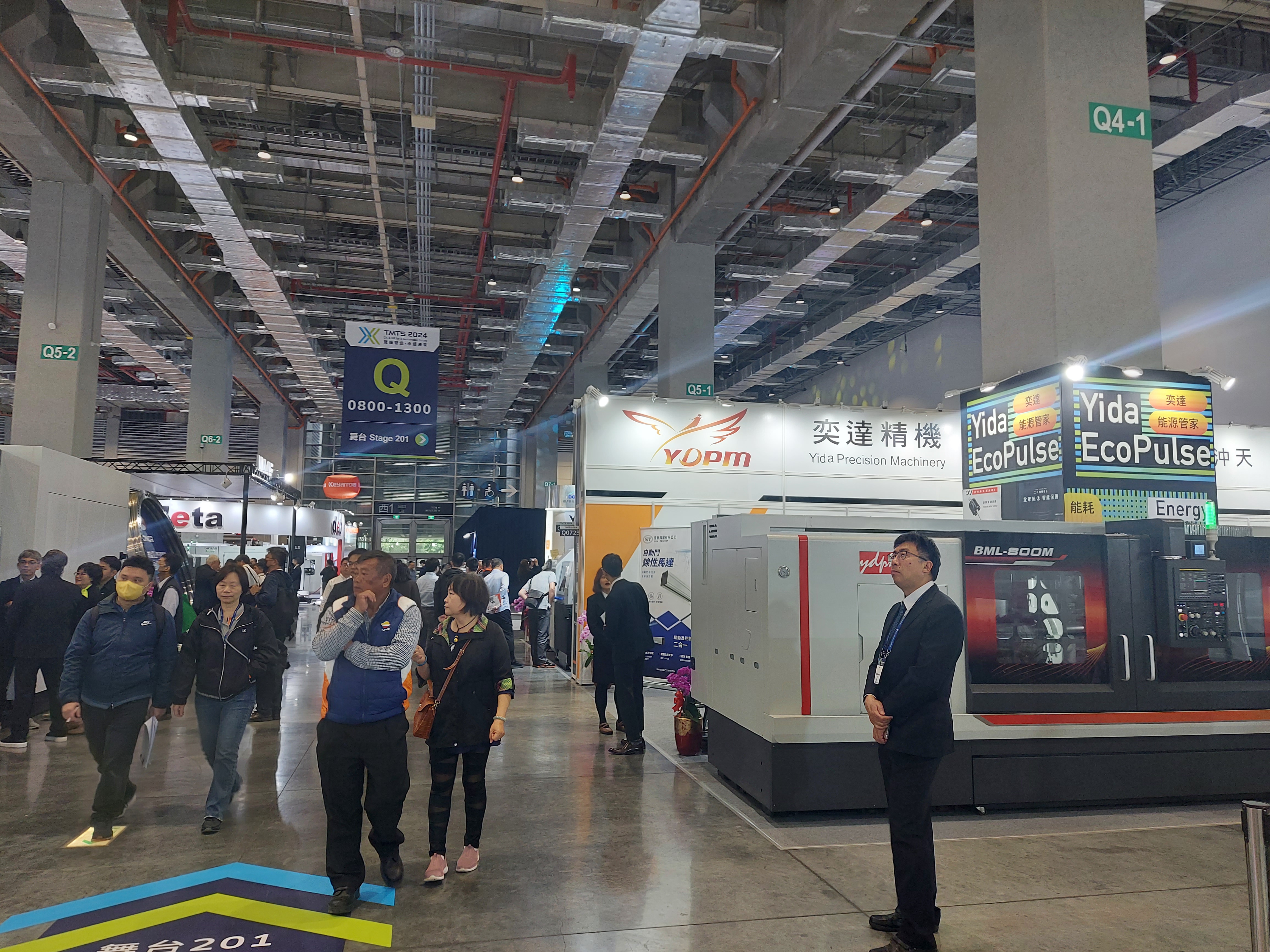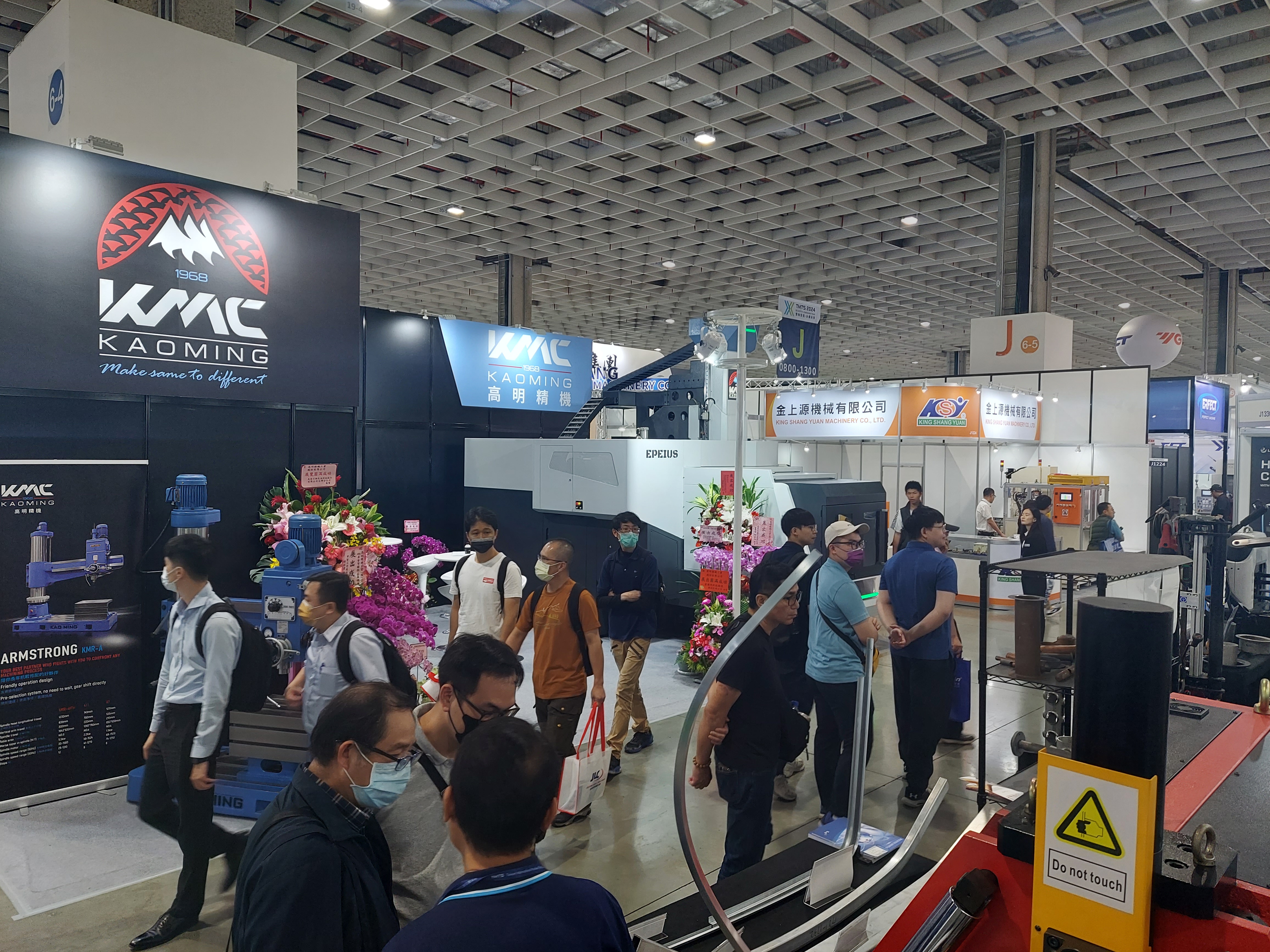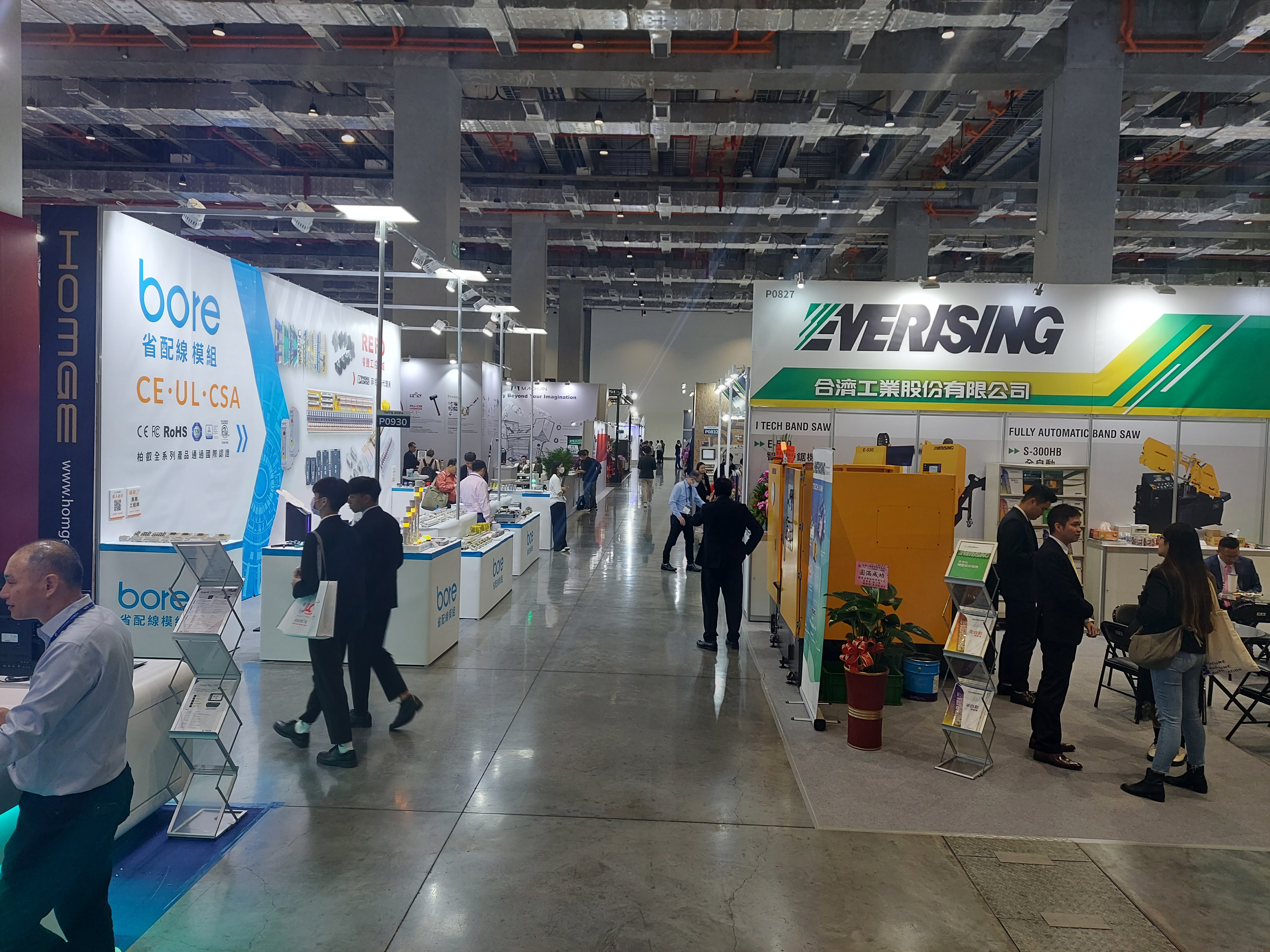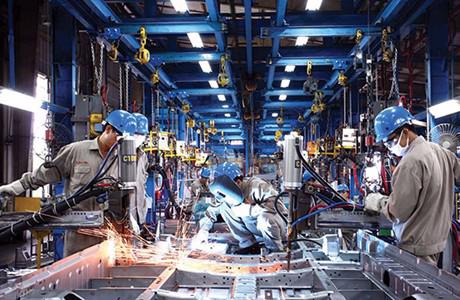Taiwan's Cutting-Edge Technologies Meet Vietnam's Green Ambitions
Beneath the tranquil veneer of Taiwan's industrial trade show lies a technological revolution. As precision robotic arms deftly handle heavy equipment with graceful, mechanical precision, a vision of sustainable, high-tech manufacturing emerges.
Neat and quiet metal cutting machine at the TMTS 2024 (video source: Vietnam Economic Times)
This juxtaposition of sophistication and eco-friendliness encapsulates Taiwan's ambitious plan to redefine the future of industry.
"Our leader Tsai Ing-wen has proposed the Smart Taiwan Plan 2021 to 2025, aiming to promote overall digital transformation and enhance the nation's digital strength in AI, IoT, and ARVR," Taiwan's chief of the executive yuan Chen Chien-jen told the audience at the biennial Taiwan Machine Tool Show (TMTS) 2024.
" We anticipate that Taiwan's industry can leverage these innovative technologies as drivers of economic growth, seizing early opportunities from restructuring of the global supply chain."
Mr. Chen's words underscored the island's strategic pivot towards smart, green industrialization – a transformation that could hold immense value for Vietnam's own manufacturing ambitions.
Taiwanese Machinery Giants Seek Vietnamese Partnerships
As visitors wandered the exhibition halls of TMTS 2024, the palpable enthusiasm of Taiwanese (China) leading machinery companies to engage with Vietnamese partners was evident.
"We're amazed by how much growth Vietnam has made and we plan to spend the next five years cultivating the market," confirmed Betty Yao, Marketing and Sales Representative of Yida Precision Machinery, a prominent CNC machine tool manufacturer.
Yida's smart manufacturing solutions, such as the award-winning ML-560MY lathe with real-time monitoring and predictive maintenance capabilities, could significantly boost productivity and quality control in Vietnamese factories.
"By combining smart machinery with automation, we've seen factories increase daily output by more than 20%," Yao told Vietnam Economic Times.

Kao Ming Machinery, another Taiwanese innovator, is pioneering remote monitoring systems that track critical production parameters like energy usage and tool condition in real-time.
"We're shifting from hardware sales to an integrated hardware-plus-service model," revealed Winnie Chiang, Kao Ming's Sales Manager. "The goal is a subscription-based offering where data-driven insights create value for the entire industrial chain," she added.
These data-driven services could help Vietnamese manufacturers optimize inventory management, predictive maintenance, and overall efficiency – all while reducing their environmental impact.
Kao Ming counts global automotive and aerospace giants like Mercedes-Benz, Porsche, Maserati, Toyota, and Boeing among its clientele, a testament to the company's capabilities.

Synergies with Vietnam's Green Growth Ambitions
The enthusiasm of Taiwanese machinery companies to access the Vietnamese market aligns seamlessly with the Southeast Asian nation's own strategic priorities.
Vietnam's National Strategy on Green Growth, spanning 2021 to 2030, outlines ambitious targets such as a 15-20% share of renewable energy, stable forest cover at 42%, and advanced water-saving techniques for 30% of irrigated crops by 2030.
"Quantifying the carbon footprint of machinery across its entire lifecycle is crucial," emphasized Mr. Le Ky Nam, Vice Chairman cum General Secretary of the Vietnam Association of Mechanical Industry (VAMI).
"Vietnamese businesses must adapt to this new paradigm of not just quality and price, but rigorous environmental standards," he told Vietnam Economic Times.
This viewpoint found resonance with Taiwan Leader Office's Secretary General, Mr. Lin Chia-lung, who recalled the island's efforts to help the vertical experimental applications of 5G in Taichung's Precision Science Park.
"We have been working together very hard to see the progress of Taiwan's dual tradition as the themes of this year are digital transformation and green transformation. And the dual transitions have to go together hand in hand because there are two spaces of one coin."
The strategic synergies between Taiwan and Vietnam's national priorities are clear. As Vietnam accelerates its own green industrialization drive, forging partnerships with Taiwan's machinery giants could prove pivotal in achieving its ambitious goals.
"We must learn from Taiwan's collaborative ecosystem between academia and industry," affirmed Mr. Nam, underscoring the need for Vietnam to emulate the island's success in fostering synergies between research, technology, and business.
Adaptive Manufacturing for Vietnam's Tropical Climate
"Adaptive" is perhaps one of the most important criteria of the smart manufacturing concept, and Taiwanese companies are at the forefront of this innovation.
Sigma CNC Technology is pioneering "adaptive" manufacturing technologies that automatically adjust parameters based on real-time data. "These keep tolerance under control even in hot, challenging environments," noted Daniel Chuang, Manager of Sigma's General Manager office, underscoring the potential fit for Vietnam's tropical landscape.

Similarly, Kao Ming's intelligent tool monitoring and thermal displacement correction systems, designed to maintain micron-level tolerances in diverse applications, could be a game-changer for Vietnamese factories operating in challenging climatic conditions.
"This kind of new technology, we actually just developed last year in 2023. Because temperature will affect the precision of manufacturing. If in Vietnam, the temperature may reach 40 degrees Celsius, the mold will not work," explained Winnie Chiang.
The result? "I have received feedback from some customers. They say it's good and it can monitor their machine. And they know when they can change the tool, they know when the temperature is ideal, and they can save time when they warm up the machine, because we can reduce the warm-up time from 30 minutes to 8 minutes. We save them 70% of the time," happily said Winnie.

Everising Machine, known for its advanced machining technologies for 40 years, has also been selling products to Vietnam for half its history.
"Regarding the green aspects, our machines now use permanent magnet motors. We will equip all our machines with these motors, which can save 20% to 30% in energy consumption, while still maintaining the same cutting power output as regular motors," explained Allen Liao, Everising Machine's Sales and Marketing Assistant Manager.
Overcoming Trust Barriers
While the Taiwanese companies expressed enthusiasm for collaborating with Vietnamese partners, they acknowledged that building trust and data transparency remained a key obstacle. "Getting clients, even Taiwanese companies, to trust our remote monitoring systems is still an obstacle, because all their machines' operation data must be shared with us" admitted Winnie Chiang of Kao Ming.
"But once they experience the value of data-driven insights for streamlining processes and reducing wastage, the benefits become clear," she added, expressing confidence in eventually overcoming this hurdle.
As the company recognizes the need to foster a collaborative ecosystem where data-sharing becomes the norm rather than the exception, Kao Ming's advanced predictive analytics, adaptive manufacturing, and subscription-based business models hold immense promise for Vietnamese manufacturers seeking to enhance efficiency and sustainability.
Charting Vietnam's Smart, Green Future
The potential synergies between Taiwan and Vietnam's manufacturing sectors were clear to Mr. Nam from VAMI. "Taiwan's mechanical manufacturing capabilities are simply top-notch," he acknowledged.
The VAMI top executive emphasized the need for a comprehensive approach, advising, "Vietnamese companies must embrace smart technologies for efficiency gains across management, logistics, maintenance, and productivity - the kind of ecosystem approach that Taiwan has been executing extremely well, rather than just scattered green applications."
This sentiment was echoed by Taiwan's Chen Chien-jen, who underscored the island authorities' unwavering support for the industry's technological transformation.
"Taiwan is aligning with the international consensus on net zero carbon emission, successively formulating the Climate Change Response act, announcing a roadmap to national net zero emission, and establishing the Taiwan Carbon Solution Exchange."
As Vietnam accelerates its own green industrialization drive, forging strategic partnerships with Taiwan's machinery giants could prove pivotal. Taiwanese firms, armed with cutting-edge automation, data analytics, and eco-friendly engineering expertise, are poised to help Vietnamese manufacturers climb the value chain while enhancing their sustainability credentials.
Data of Vietnam's General Statistics Office shows the nation's manufacturing sector is poised for steady growth, with the group of goods to be imported (including machinery, equipment, tools, spare parts, and raw materials for domestic production) accounting for 89% of Vietnam's total import turnover in the first quarter of 2024, valued at an estimated USD 75.7 billion, up 16.1% over the same period in 2023.
However, to truly harness this potential and transform Vietnam into a leader in smart, green manufacturing, strategic alliances with industry pioneers like Taiwan will be crucial.
The Vietnamese government's National Strategy on Green Growth underscores this imperative, setting ambitious targets that can only be achieved through the integration of cutting-edge technologies and processes.
By tapping into Taiwan's wealth of expertise in intelligent automation, data-driven services, and eco-friendly engineering, Vietnam can accelerate its own industrial evolution, positioning itself as a hub for sustainable, high-value manufacturing in the years to come.
The potential for this partnership is vast, and the time to act is now, as global supply chains continue to realign and consumers demand ever-greater environmental accountability.









 Google translate
Google translate